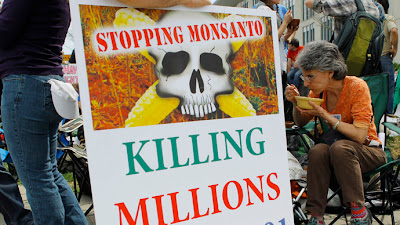First watch :
The World Against Monsanto: Holding the Corrupt Accountable
GMO technology will enslave generations of Uganda farmers
Publish Date: May 25, 2013
I am writing to respond to Dr. Opiyo Oloya’s article that appeared in the New Vision of May 22. Opiyo Oloya’s article “GMO technology will enslave generations of Ugandan farmers” is timely and wish add my voice to the urgency needed to pull the proposed National Biotechnology and Biosafety Bill 2012 off the table.
The solution to Uganda’s and East Africa’s food security situation good or bad as it now be cannot and shall never be solved by introduction of Genetically Modified seeds production by biotech giant Mosanto or any other international corporate companies.
I think weakness of our food security situations can only be solved by reviewing our food production, consumptions, markets trends and, above all, investing in conservation of national ecosystems.
Biotech giants like Mosanto have come under intense criticism all over the world and their next and only lifeline is Africa. Recently, Hungary took a bold stand against biotech giant Mosanto and genetic modification by destroying 1,000 acres of maize found to have been grown with genetically modified seeds.
The South American nation of Peru recently took charge to help protect not only its own citizens but also the people of the countries to whom it exports food crops from the horrors of biotechnology and successfully implemented a 10-year moratorium on GMOs.
The majority of our politicians and biotech giants will refuse to acknowledge the impact of GMOs on future of our food systems and the environment, but their very nature alone (GMOs), contradicts actual nature.
The ways in which GMOs are planted, cultivated, and harvested are all highly unsustainable and leads to major problems both for the environment and for humans. Chemical pollution, chronic illness epidemics, widespread soil depletion, emergence of resistant "superbugs" and "superweeds" and chemical pollution are some of the consequences of GMOs.
A court in Lyon recently ruled that Monsanto’s Lasso weedkiller formula, (containing alachlor) caused Paul Francois, a local farmer to develop neurological damage as persistent memory loss, headaches, and stuttering during speech.
Reports say that the 47 year old farmer sued Monsanto in 2004 after inhaling the Lasso product while cleaning his sprayer tank equipment. Soon after, Francois had symptoms that prevented him from working. Monsanto’s Lasso packaging did not have adequate warnings about the dangers of exposure.
The French court agreed with the claims and evidence presented, declaring earlier this year that “Monsanto is responsible for Paul Francois’ suffering and must entirely compensate him.”
Exposure to alachlor can cause damage to the liver, kidneys, spleen, eyes, and could lead to the development of anemia or even cancer.
How many of our local farmers in Uganda are poisoned daily by unlabelled agriculture chemicals applied in the name of improving production but with less regard to the soils and environment?
I am picking a paragraph from President Museveni’s recent address at the East Africa Legislative Assembly in Kigali; “Our Banyankole [western Uganda tribesmen] people say: Kamara matsiko nka icumu rya ahanda. This translates as: “When a spear thrust by the enemy injures your internal organs, then you know that your hope for survival is very limited”.
What then will be the situation when the National Biotechnology and Biosafety Bill 2012 is passed in its current state and corporate companies and biotech giants control want we plant, eat, how much we sell and store? Is that “Icumu rya ahanda?”
The best way to avoid enslavement is now; pull off the Biotechnology and Biosafety Bill 2012.
The writer is the founder ICOD Action Network
ahamitch@gmail.com
